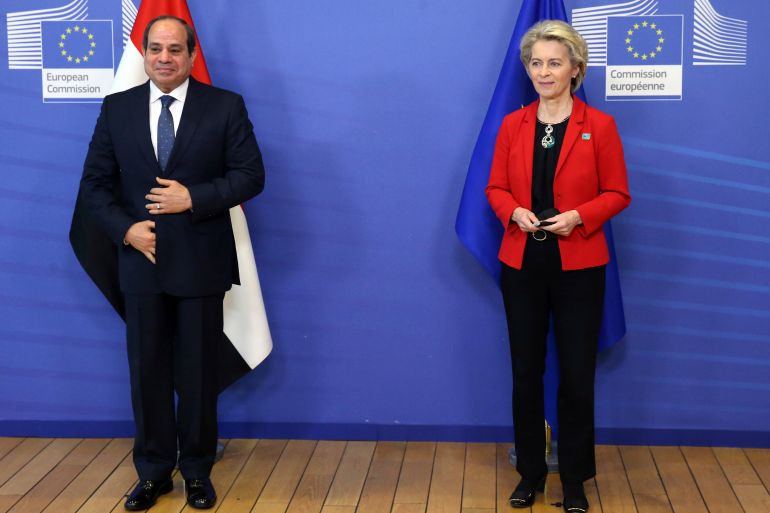EU announces $8bn package for Egypt as part of deal to check migration
The agreement, which lifts the EU’s relationship with Egypt to a ‘strategic partnership’, has drawn criticism from rights groups.

The European Union has announced a 7.4 billion-euro ($8.06bn) aid package and an upgraded relationship with Egypt, part of a new deal to stem migration flows to Europe that has been criticised by rights groups.
The deal is scheduled to be signed during a visit on Sunday by European Commission President Ursula von der Leyen and leaders of Belgium, Italy, Austria, Cyprus and Greece, according to officials.
Keep reading
list of 4 itemsUAE in talks to develop $22bn beach land in Egypt
How Israel’s war on Gaza is bleeding Egypt’s economy
Four Egyptian officials back on trial in Italy over death of Giulio Regeni
Egyptian President Abdel Fattah el-Sisi met separately with von der Leyen and other European leaders before the signing ceremony.
The aid package includes both grants and loans over the next three years, with the EU saying it is upgrading its relationship with the Arab world’s most populous country to a “strategic partnership”.
The proposed funding includes 5 billion euros ($5.45bn) in concessional loans and 1.8 billion euros ($1.96bn) of investments, according to a summary of the plan published by the EU. An additional 600 million euros ($654m) would be provided in grants, including 200 million euros ($218m) for managing migration issues.
El-Sisi’s office said in a statement that the deal with the EU aims to achieve “a significant leap in cooperation and coordination between the two sides and to achieve common interests”.
Egypt’s economic uncertainty has pushed many to migrate from the Arab nation, with Europe interested in curbing migration from Egypt and elsewhere in North Africa.
But European governments are worried about the fallout from growing instability in Egypt, which has been struggling to raise foreign currency and has inflation running close to record highs.
Earlier this month, however, the country struck a record deal for Emirati investment, expanded its loan programme with the International Monetary Fund (IMF), and sharply devalued its currency.
‘Flawed blueprint’
The deal comes amid growing concerns that Israel’s looming ground offensive on Gaza’s southernmost town of Rafah could force hundreds of thousands of Palestinians to break into Egypt’s Sinai Peninsula. The Israeli war on Gaza, now in its sixth month, has pushed more than a million people to Rafah.
Egypt says it is hosting nine million refugees and migrants, including about 480,000 registered refugees and asylum seekers with the United Nations’ refugee agency. Many of those migrants have established their own businesses, while others work in the huge informal economy as street vendors and house cleaners.
But Egyptian officials say Cairo deserves recognition for largely shutting off irregular migration from its north coast since 2016 although there has been a surge in Egyptians trying to cross to Europe via Libya, and the EU is already providing support aimed at reducing those flows.
In recent months, the Greek islands of Crete and Gavdos have seen a steep rise in migrant arrivals – mostly from Egypt, Bangladesh and Pakistan – raising concerns about a new Mediterranean smuggling route.
Activists have criticised Western backing for el-Sisi, who came to power a decade ago after leading the overthrow of Egypt’s first democratically elected leader.
A crackdown has swept up dissidents from across the political spectrum, while the state and the army have extended their grip on the economy, which businessmen and analysts say has impeded structural reforms demanded by the IMF.
El-Sisi’s backers say security measures were needed to stabilise Egypt and pave the way for providing social rights such as housing and jobs.
The EU says its expanded partnership with Egypt is meant to promote democracy and freedoms, but its moves to offer financing in return for migration curbs have run up against obstacles and criticism.
“The blueprint is the same as the flawed EU deals with Tunisia and Mauritania: stop migrants, ignore abuses,” Human Rights Watch said of the plan to enhance ties with Egypt and provide new financing.
Amnesty International also urged the European leaders not to be complicit with rights violations taking place in Egypt.
“EU leaders must ensure that the Egyptian authorities adopt clear benchmarks for human rights,” said Eve Geddie, the head of Amnesty International’s European institutions office.